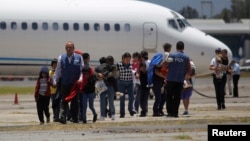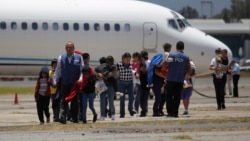President Barack Obama recently met with the leaders of El Salvador, Guatemala, and Honduras to discuss the significant rise of unaccompanied children traveling to the U.S. border.
The United States has taken significant steps to alleviate this situation. This includes sending an unprecedented number of Border Patrol agents and resources to the border and establishing more facilities to care for these children and more resources for immigration courts to process claims in a way that is humane, orderly and timely.
We are also conducting information campaigns in Central America to dissuade children from making the dangerous journey to the U.S. border and correct misperceptions about U.S. immigration law and benefits, as well as providing assistance to address the underlying factors of the crisis through the Central America Regional Security Initiative.
President Obama stressed that the American people "have great compassion for these children and want to make sure that they are cared for."
But President Obama also emphasized that we must “deter a continuing influx of children putting themselves at great risk." He noted that children and families who do not have proper immigration claims will be subject to repatriation to their home countries.
This is necessary, said President Obama, because, “[A] disorderly and dangerous process of migration, …not only puts the children themselves at risk, but also calls [in]to question the legal immigration process [for] those who are properly applying and trying to enter” the United States.
The United States recognizes that a successful response to this complex situation requires shared action and responsibility from all the countries involved – our own, the three sending countries of Central America, and Mexico. We appreciate the recent efforts of the governments of El Salvador, Guatemala, Honduras, and Mexico to discourage the migration of children by targeting and arresting human traffickers and smugglers while working with the United States to repatriate the children and their families in a safe and humane way.
Beyond attending to this immediate humanitarian situation, more must be done to address factors contributing to the influx of child migrants, such as crime, gang violence, and limited opportunities in the countries involved. The United States is working with our Central American partners to promote prosperity, security, and good governance.
By working together, the United States, El Salvador, Guatemala, and Honduras can find a humane solution to the dangerous and illegal migration of children and build better opportunities back home.






